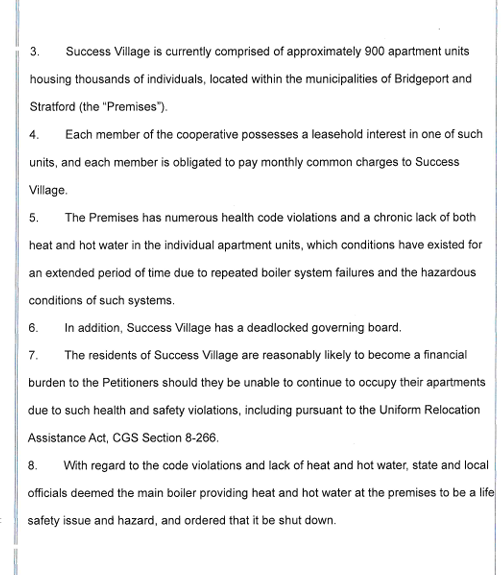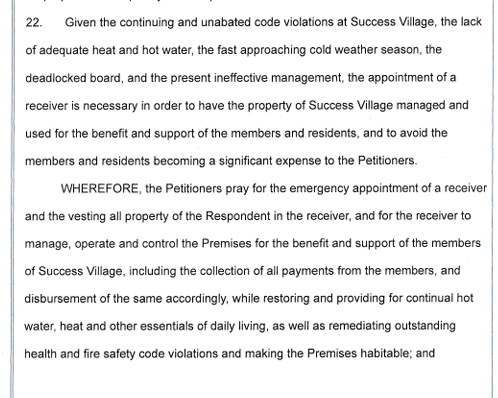Declaring the residents at Success Village are likely to become “a financial burden…should they be unable to continue to occupy their apartments due to such health and safety violations” the municipalities of Bridgeport and Stratford have joined forces in a state lawsuit urging the court to appoint a management firm to oversee the troubled Success Village co-op whose thousands of residents have suffered from a lack of heat and hot water due to an antiquated boiler system.
The legislative bodies of both towns have approved a combined loan of $650,000 to be provided upon the appointment of a receiver to address the heating woes.
Southern Connecticut Gas and United Illuminating have also filed a receivership request claiming they are owed $1.3 million by the cooperative.
A court hearing on the Bridgeport-Stratford request is scheduled for Friday.
See request to court here followed by excerpts:




Do you find it curious that State rules seem to govern the handling of such “ownership interests” and self-governance process, such that local boards or commissions and political bodies can point to those rules when initially approached for “somebody to do something”?
Yet municipal Boards of Health, and Fire Marshals, and other public safety officers are asked to provide expertise and oversight? But there are NO FOLKS IN BRIDGEPORT SERVING ON A FAIR HOUSING COMMISSION, a body that might provide early focus the multiple issues concerning the thousands of Success Village residents. Why has that been allowed to endure for 20 years when oversight of issues of self-governance for co-ops and condos might have surfaced there?
Where is the municipal effort to educate, inform, and represent resident issues that are based on citizen participation? Is Gen-Now the only practical purveyor of course work on this subject currently? Are there other examples of failing self-governance, for example with condominiums, in Bridgeport now? Who picks up the financial responsibility by law? Time will tell.
Real estate investment experts largely rate condominium ownership as a high-risk investment. Why is that? The reason most cited is that the boards set up to manage condominiums are often not equipped for such oversight and tend not pay attention to the less-obvious, and even the obvious, long-term needs of the common/collective basic/supportive infrastructure. There is a lack of education, and often a related lack of motivation at the root of the problem in this regard. And then there are the natural political disincentives for board-member oversight — including the desire to appease anger among fellow residents by upping common charges or mandating certain upkeep standards for owner-members — as well as the temptation to reach into the cookie jar illegally. I saw/see a combination of these board-centered problems in condo developments where friends and family members reside/have resided.
And then there is the investor/absentee-landlord problem, where investors are able to corrupt board members into creating ownership stressors — such as continued levying of unnecessary common charges, with no improvements associated with the charges, in order to stress modest-income owners into selling cheaply to investors — a very nefarious situation often associated with board-member hands in the cookie jar… And then there’s the board-member kick-back/unscrupulous contractor problem, where maintenance work/”improvements” are undertaken by contractors in the context of shoddy work/shortcuts and the hiring board committee members are “rewarded” by the contractors… (Condominium developments are microcosms of municipal government in many ways — and often “connected”…)
I think that Success Village will be seen to be a victim of “all of the above” problems with internal condominium governance — as well as problematic connections to government — the latter of which should be providing oversight of the board, not protection of “connected” members, as appears to be the case…
I know of other such ticking, “$time-bomb$” condo situations in Bridgeport. Two well-known such developments come to mind quickly.
JML is absolutely correct in continuing to remind us that our city has dropped the ball on its essential role in the oversight of housing issues on behalf of the people of Bridgeport…. City Hall’s refusal to address the need for a fair-housing committee is nothing short of shameful — and suspicious…. (Too many real-estate investors in policy positions in Bridgeport City Hall looking to snap-up “cheap” Bridgeport real estate to flip or rent…)